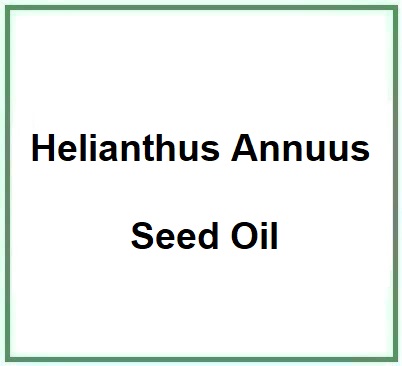Helianthus Annuus Seed Oil is the oily product obtained from the plant of the same name. the sunflower.
Industrial Production Process
- Preparation of reagents. The main raw material includes Helianthus annuus (sunflower) seeds.
- Harvesting and cleaning. Sunflower seeds are harvested at peak maturity to ensure maximum oil yield. The harvested seeds are then cleaned to remove dirt, dust, and other impurities.
- Drying. The cleaned sunflower seeds are dried at a controlled temperature to reduce moisture content, facilitating oil extraction.
- Pressing. The dried seeds are mechanically crushed and pressed to extract the oil. This process can be done cold for extra virgin oil or hot for higher yield.
- Filtration. The crude extracted oil is filtered to remove solid residues and impurities, resulting in a clearer, cleaner oil.
- Refining. The filtered oil can be further refined through processes such as neutralization, bleaching, and deodorization to improve the oil's quality and stability.
- Stabilization. The refined sunflower seed oil is stabilized to ensure its stability during transportation and storage, preventing oxidation and degradation.
- Quality control. The sunflower seed oil undergoes rigorous quality testing to ensure it meets standards for purity, efficacy, and safety. These tests include chemical analysis, spectroscopy, and microbiological testing.
What it is used for and where
Helianthus Annuus Seed Oil is extracted from the seeds of the sunflower plant and is rich in essential fatty acids, primarily linoleic acid (Omega-6) and oleic acid (Omega-9). These fatty acids provide excellent moisturizing properties and help to strengthen the skin barrier, reducing moisture loss. The oil is also a significant source of Vitamin E, a powerful antioxidant that protects the skin from free radical damage. It is ideal for skincare products, such as moisturizing creams, lip balms, and body treatments,
Cosmetics - INCI Functions
Skin conditioning agent - Emollient. Emollients have the characteristic of enhancing the skin barrier through a source of exogenous lipids that adhere to the skin, improving barrier properties by filling gaps in intercorneocyte clusters to improve hydration while protecting against inflammation. In practice, they have the ability to create a barrier that prevents transepidermal water loss. Emollients are described as degreasing or refreshing additives that improve the lipid content of the upper layers of the skin by preventing degreasing and drying of the skin. The problem with emollients is that many have a strong lipophilic character and are identified as occlusive ingredients; they are oily and fatty materials that remain on the skin surface and reduce transepidermal water loss. In cosmetics, emollients and moisturisers are often considered synonymous with humectants and occlusives.
Solvent. It is the substance for dissolving or dispersing surfactants, oils, dyes, flavourings, bactericidal preservatives in solution.In fact, it dissolves other components present in a cosmetic formulation. Solvents are generally liquid (aqueous and non-aqueous).
Skin conditioning agent - Miscellaneous. This ingredient has the task of modifying and improving the condition of the skin when it is damaged or dry, reducing flaking and restoring its elasticity.
Skin conditioning agent - Occlusive. This ingredient has the task of modifying the condition of the skin when it is damaged or dry by reducing flaking and restoring elasticity. It has a strong lipophilic character and is identified as an occlusive ingredient; it is generally composed of oily and fatty materials that remain on the skin surface and reduce trans epidermal water loss.
CAS: 8001-21-6
EC number 232-273-9
Cosmetic Applications
Emollient Properties. Sunflower seed oil softens and moisturizes the skin, making it smooth and soft to the touch without leaving a greasy feel.
Rich in Antioxidants. Contains high amounts of vitamin E, a powerful antioxidant that helps protect the skin from damage by free radicals and environmental exposure.
Strengthening the Skin Barrier. Helps maintain the integrity of the skin barrier, reducing moisture loss and protecting the skin from irritations and infections.
Anti-inflammatory Effects. Due to its rich composition in fatty acids, such as linoleic acid, it offers anti-inflammatory benefits useful for sensitive skin or conditions like eczema.
Versatile Applications. Used in a variety of products, from creams and lotions to lip balms and hair care products, sunflower seed oil is an extremely versatile ingredient.
Other Applications
Food Industry. Sunflower seed oil is used as a cooking oil for its favorable nutritional profile and its resistance to oxidation at high temperatures.
Hair Care Products. Employed in hair formulations to nourish and protect strands, leaving hair shiny and manageable.
Animal Care Products. Used in animal skin care products for its similar properties, improving the condition of the skin and fur of pets.
References______________________________________________________________
(1) Anushree, S., André, M., Guillaume, D., & Frédéric, F. (2017). Stearic sunflower oil as a sustainable and healthy alternative to palm oil. A review. Agronomy for sustainable development, 37, 1-10.
(2) Aguilera, C. M., Mesa, M. D., Ramirez-Tortosa, M. C., Nestares, M. T., Ros, E., & Gil, A. (2004). Sunflower oil does not protect against LDL oxidation as virgin olive oil does in patients with peripheral vascular disease. Clinical nutrition, 23(4), 673-681.
(3) Bravi E, Perretti G, Falconi C, Marconi O, Fantozzi P. Antioxidant effects of supercritical fluid garlic extracts in sunflower oil. J Sci Food Agric. 2017 Jan;97(1):102-107. doi: 10.1002/jsfa.7690. Epub 2016 Apr 1. PMID: 26921177.
![]() Helianthus Annuus Seed Oil
Helianthus Annuus Seed Oil 

